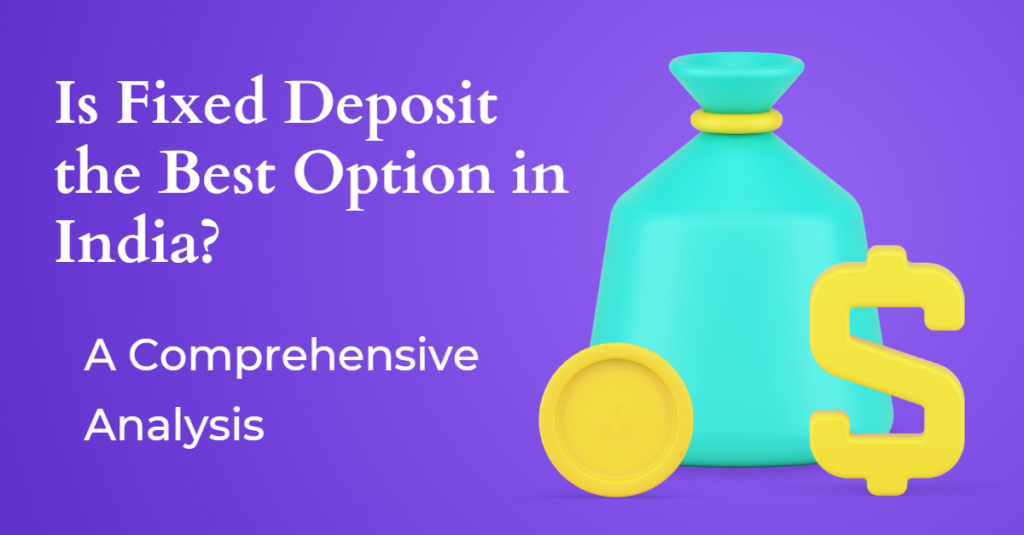Is Fixed Deposit the Best Option in India? A Comprehensive Analysis
Introduction:
In the vast and dynamic landscape of investment options available in India, fixed deposits (FDs) have gained immense popularity among investors. Known for their safety and reliability, FDs offer a stable and consistent avenue for individuals looking to grow their savings. However, in a world of diverse investment opportunities, it is essential to critically examine whether fixed deposits truly stand as the best option for investors in India. In this article, we will conduct a comprehensive analysis of fixed deposits, exploring their advantages, limitations, and suitability for various financial goals.
I. Understanding Fixed Deposits:
To begin our analysis, let’s understand the fundamentals of fixed deposits. Fixed deposits are financial instruments offered by banks and non-banking financial institutions (NBFCs) where individuals can deposit a sum of money for a predetermined period at a fixed interest rate. At the end of the tenure, the principal amount along with the accrued interest is returned to the depositor.
II. Advantages of Fixed Deposits:
- Safety and Security: One of the primary reasons individuals opt for fixed deposits is their safety and security. Unlike other investment options such as stocks or mutual funds, FDs offer a guaranteed return on investment. The principal amount is secure, and the interest earned is predetermined, providing a sense of stability and peace of mind to conservative investors.
- Fixed Returns: Fixed deposits provide investors with a predictable and assured income. The interest rates for FDs are fixed at the time of investment, enabling investors to plan and budget accordingly. This makes FDs particularly attractive to individuals who prioritize capital preservation and seek a steady income stream.
- Diverse Tenure Options: Fixed deposits offer flexibility in terms of tenure options. Investors can choose short-term deposits ranging from a few months to long-term deposits extending up to several years. This allows individuals to align their investments with their financial goals, whether it be saving for a down payment on a house or planning for retirement.
- Liquidity Options: While fixed deposits are typically considered less liquid than certain other investments, many financial institutions offer premature withdrawal facilities with certain conditions. This ensures that investors can access their funds in case of emergencies or unforeseen financial needs, albeit with a potential reduction in interest rates.
III. Limitations and Considerations:
- Inflation Risk: One significant limitation of fixed deposits is the potential erosion of purchasing power due to inflation. If the interest rate offered on FDs does not outpace the inflation rate, the real value of returns diminishes over time. It is essential for investors to carefully assess the prevailing inflation rates and choose FDs with competitive interest rates to combat this risk.
- Lower Returns Compared to Market-Linked Instruments: While fixed deposits provide stability, they often offer lower returns compared to market-linked instruments such as stocks or mutual funds. Investors with a higher risk appetite and a longer investment horizon may find other avenues more suitable for wealth creation and beating inflation.
- Tax Implications: Interest earned from fixed deposits is subject to taxation. Depending on the investor’s tax bracket, the post-tax returns may significantly reduce the overall profitability of the investment. It is crucial for individuals to understand the tax implications and consider them when evaluating the viability of fixed deposits.
IV. Suitability and Alternatives:
- Suitable for Conservative Investors: Fixed deposits are well-suited for conservative investors seeking stability, capital preservation, and regular income. Individuals who prioritize security over high returns can rely on FDs as a reliable investment option.
- Alternatives to Consider: For investors looking for higher returns or willing to take calculated risks, exploring alternatives to fixed deposits is essential. Options such as equity investments, mutual funds, or real estate can provide greater potential for wealth creation, albeit with associated risks and market fluctuations.
Conclusion: (Is Fixed Deposit the Best Option in India? A Comprehensive Analysis)
While fixed deposits have long been a trusted investment avenue in India, determining whether they are the best option requires careful consideration of an individual’s financial goals, risk tolerance, and investment horizon. Fixed deposits provide stability, safety, and assured returns, making them attractive to conservative investors seeking capital preservation. However, for individuals with longer-term investment goals and a higher risk appetite, exploring other avenues such as equities or mutual funds might offer higher potential returns.
In summary, fixed deposits in India remain a viable investment option for those prioritizing stability and assured income. However, investors should evaluate their unique financial circumstances, consider inflation, taxation, and explore alternative investments before determining if fixed deposits align with their specific goals and expectations.

My name is Rohit Vagh and I’m a content writer specializing in fashion and lifestyle. I have three years of experience in this field and have written various articles. My writing style is creative and engaging, and I strive to create content that resonates with my readers. I have a deep passion for fashion and am constantly researching the latest trends and styles to make sure my readers are up to date. I’m excited to continue my career in blogging, and I’m always looking for new opportunities in the fashion and lifestyle space.





